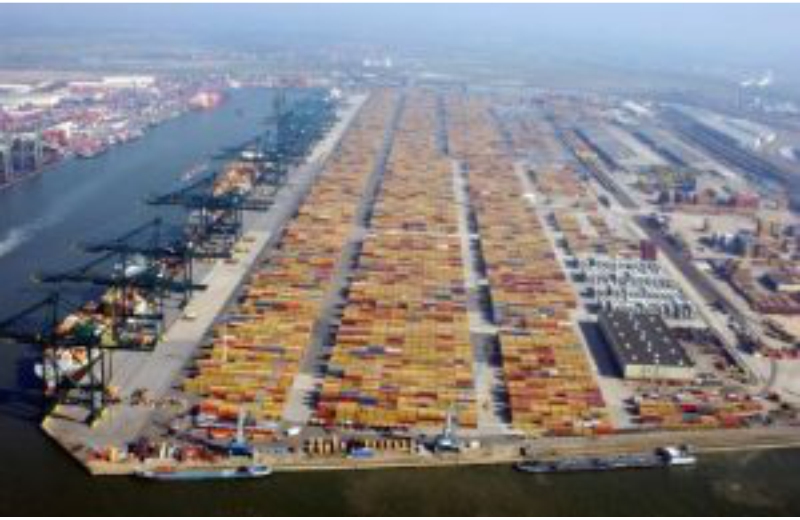The port of Antwerp is to invest €1.4 million over the next three years in projects aimed at making port-generated freight traffic smoother and more efficient. The seven projects that have been selected for financial support will together reduce the number of truck trips by up to 250,000 annually. The Flemish government, in turn, is building on the Call for Proposals by the Port Authority, and in the next few months it will release a further €1.4 million for projects to make transport in and around Antwerp more sustainable.
Port alderman Mr Marc Van Peel explained further: “A modal shift towards more sustainable methods of transport that place less burden on our roads or even avoid them altogether is crucial for more efficient mobility, not only at present but also in the future. That’s why the Port Authority will be supporting private sector projects over the next few years that contribute to more efficient truck and other transport in and around the port.”
Call for Proposals
The seven projects that will receive financial support have been selected on the basis of a Call for Proposals (CfP) issued by the Port Authority at the start of this year. With the CfP, the Port Authority aimed to stimulate the market “to come up with new, more sustainable mobility solutions, or improvements to existing mobility solutions for handling the flow of maritime trade”. The projects that were submitted were assessed on the basis of various criteria, including, among others, whether they offered a reliable and price-competitive alternative to existing, less sustainable solutions, and whether also they were based on a profitable business plan. The seven projects that were ultimately selected can each count on maximum support of €200,000 spread over a period of three years.
The seven projects selected are as follows:
* DP World: Shift to rail
The terminal operator DP World aims to make improvements to existing rail products and to attract new rail services, such as a new service to Stuttgart that will offer a sustainable transport alternative for the German car industry. DP World has set itself the target of raising the proportion of rail transport in its operations to 10 per cent by the year 2020. The project will reduce the number of car transporter trips by 50,000 annually.
* Delcatrans: Shift to barge
The multimodal logistics service provider Delcatrans is developing a reefer platform for barge transport at its River Terminal in Wielsbeke. West Flanders is an important European hub for the deepfreeze industry, including, among others, deep-frozen vegetables and potato products from Flanders that are sent via Antwerp to destinations all over the world. By using barges for transport to and from Antwerp, the project will help to avoid as many as 5,400 truck trips annually.
* Hakka NV: Avoiding empty truck trips
Hakka NV operates a digital platform for the truck industry. The company has submitted a proposal that uses its platform for an application that finds return loads for trucks, thus avoiding empty trips and making truck transport more efficient. Over the space of a year, it will save 120,000 truck trips.
* Port-Liner Holding CV: Construction of hybrid barges
The Dutch company Port-Liner specialises in building “zero emission” barges. The company submitted a project under which it will build five hybrid barges that will ply between De Kempen intermodal terminal in South Netherlands and Antwerp. Thanks to these hybrid barges, there will be 23,000 fewer trucks on the roads annually.
* Danser: Innovation in barge transport
Danser, one of the largest intermodal operators in Europe, has submitted not one but two innovative barge concepts. It aims to save 26,000 truck trips per year by setting up a hub-and-spoke concept along the Brussels-Scheldt canal, and by introducing a corridor system between northern France and Antwerp.
* Euroports Inland Terminals: Direct rail link to Liège
Euroports Inland Terminals, a member of the Euroports Group, is to introduce a new rail connection between Liège (Ile Mosin) and the port of Antwerp. By offering a direct rail connection twice per week as of January 2018, the region around Liège which is already very well served by barge will become more accessible also for customers who are in search of rail products. Over the space of a year, this will lead to 16,200 fewer truck trips.
* Slovak Shipping and Ports: Direct rail link to Bratislava
Slovak Shipping and Ports is a container terminal operator from Bratislava in Slovakia. In the second half of 2018, the company will start operating combined trains with a mixture of intermodal and conventional wagons that will travel two times per week between the terminal in Bratislava and the port of Antwerp. The frequency will later be raised to four per week. By connecting the port of Antwerp more efficiently by rail with the eastern European hinterland, this project will save 6,000 truck trips on average per year






